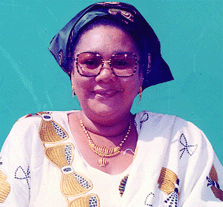How do we adequately introduce Laila Dogonyaro? Maybe a Gladiator amongst men, or a Titan amongst women. Big, Bold, Beautiful, and a Bulldozer. Yes, she was a bulldozer in every sense; blazing trails in otherwise dreaded terrains, and clearing paths for others to walk with a greater sense of ease. Dogonyaro was simply Audacious, Bodacious and Courageous.
Early life
Born in Kano in 1944, Laila Dogonyaro was of Syrian descent; though her mother was of the Hausa-Fulani stock. As a child, she had her primary schooling at St. Loius Primary School, Kano. But that was as much as a formal education she could get. This was because her opportunity to continue secondary education was cut short by marriage. At that time, the Northern culture didn’t place value on the girl-child education and because of that, Laila was married off at about the age of 12 (or 13) to a much older man, Alhaji Ahmed Gusau. (Note: the uncertainty of the exact age of marriage is because of the inadequate record keeping of childbirths at the time and place she was born.)
Laila: Advocate and Activist, Philanthropist and Politician
The impact of her early marriage was huge on Laila’s life. It informed her decisions and influenced her perception of life generally. As a younger woman, Laila decided to engage in ‘grass-root’ unionism and politics. Her main objective was that of improving the fortune of the girl-child, especially in the North. Laila Dogonyaro was one of the earliest and most ardent advocate for the girl-child education. She was also very vocal against one of the biggest problems of Northern women in Nigeria; the Vesico-vaginal Fistula (VVF) problem.
The Vesicovaginal fistula (VVF)in layman’s terms, is an occurrence of an abnormal hole between the bladder or rectum and the reproductive organ of the woman (the vagina precisely). This leads to uncontrollable leakage of urine. The disease is of high prevalence in illiterate and poverty stricken societies, and the most affected groups are young teenage girls of poor socio-economic background and some first time mothers. Research has also shown that though it occurs predominantly in both the northern and southern parts of Nigeria, with the incidences in the North being more conspicuous.
Its high incidence in the North was a spurring factor for Laila Dogonyaro to speak up for the girls and women that suffered from, and were stigmatized for this disease. Most of these women were abandoned and left to their fate by their families; their self-esteem bruised, their ego shattered, their sense of self-worth destroyed.
Laila: From Little Beginnings to Great Influence
Interestingly, Laila Dogonyaro was introduced into advocacy by her husband. He was also of tremendous support and encouragement to her in most of her endeavors.
In 1963, The Jami’yar Matan Arewa (Northern Women’s Union) was founded, with Dogonyaro as one of the pioneers. TheJam’iyyar Matan Arewa was a women’s welfare organization, affiliated with Northern People’s Congress (NPC), with a focus on the welfare of poor families in Northern Nigerian communities. The organization established schools, WAEC centres and gave support to women’s suffrage in the region. By the early 1970s, Dogonyaro was Secretary of Jam’iyyar Matan Arewa. She played aprominent role in women’s struggle both in Northern Nigeria and the country as a whole.
Dogonyaro never hesitated to break stereotypes; she was a trail blazer in women’s active participation in politics; she contested an election in the Tundun Wada Constituency in 1977, at a time, where politics was an exclusive preserve of the male gender. In 1979, she was a member of National Party of Nigeria. Her audacity to venture into ‘seemingly’ impossible arenas like politics earned her the apt description; the Queen of Modern Northern Politics.
From 1985 to 1993, she was the state chairperson for National Council of Women Societies and by 1993, Dogonyaro became the President of the association.There was barely a feminist movement that Dogonyaro wasn’t involved in; from the active fight for women suffrage in the North in the Second Republic, to the more recent fight to increase the participation of women in politics and other feminine political issues.In 1998, Dogonyaro founded the Women’s Opinion Leaders Forum (WOLF).
Later Life, Legacy and Death
Laila Dogonyaro lived most of her life in Kaduna, though she relocated to Kano from where she regularly journeyed back and forth Garki, in Jigawa State. She was conferred with the traditional title‘Garkuwan Garki’,by the Emir of Gumel, Alhaji Ahmed Muhammad Sani. She spent the bulk of her life sensitizing rural women as well as empowering them economically, especially through various skills acquisition programmes. In order to further promote her passion for the girl-child education, it is reported that she single-handedly built a private girls’ school in her hometown, Garki in Jigawa State.
In recognition of her activism, Dogonyaro was honoured with the title of Officer of the Order of the Niger (OON) in 2001.
She had managed diabetes and hypertension for many years. She eventually died at the age of 67 after a brief illness on the 28th April 2011, at the Aminu Kano Teaching Hospital in Kano State.
In a qualitative sense, and without any intent to detract from any personality, Laila Dogonyaro stands in a class of greatness; she could comfortably square shoulder to shoulder with Eyo Ita, and stand toe to toe with Funmilayo Ransom Kuti.
Laila Dogonyaro’s life is an inspiration to draw from; sometimes in life, you do not know what you can get away with till you try. Laila exemplified testing deep waters without fear, and often times successfully mastered the waves.
Sources:

